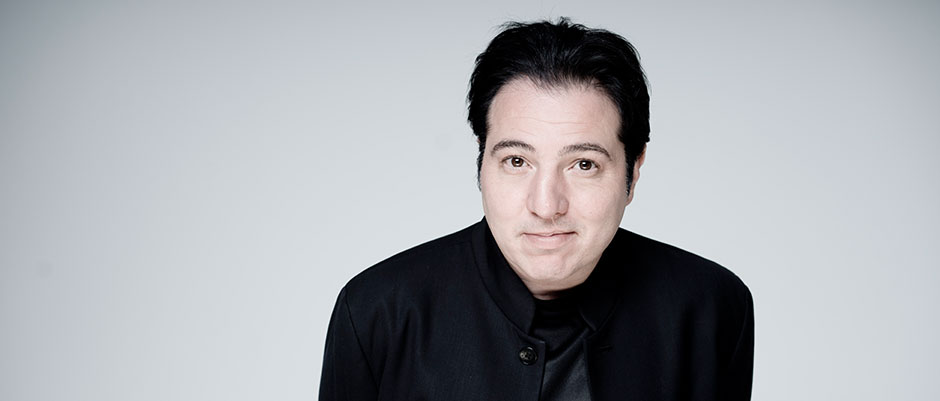Fazil Say zählt zu den kreativsten und gefragtesten Pianisten weltweit. Am 14. Januar 1970 als Sohn eines Musikwissenschaftlers in Ankara geboren, begann er bereits als Jugendlicher Klavier und Komposition am Konservatorium der türkischen Hauptstadt zu studieren. 1986 hörte der amerikanische Pianist David Levine den damals 16-Jährigen in Ankara und nahm ihn in seine Meisterklasse auf. Das Tor zur internationalen Karriere öffnete sich, als Say 1994 den „Young Concert Artists“ Wettbewerb in New York gewann. Er hat seither auf allen Kontinenten konzertiert und ist bei den großen amerikanischen und europäischen Orchestern ein gern gesehener Solist.
Says Name steht auch für politisches Engagement. Für Schlagzeilen sorgte der Musiker etwa 2002, als er in einem Interview eine schleichende Islamisierung des Landes sowie Menschenrechtsverstöße beklagte. Zehn Jahre später musste sich Say gar vor Gericht verantworten: Der bekennende Atheist hatte per Twitter Witze über den Islam gemacht. Er wurde wegen Blasphemie zu einer Gefängnisstrafe auf Bewährung verurteilt. 2015 hob das Oberste Gericht den Beschluss aber wieder auf und stellte Says Äußerungen unter den Schutz der Meinungsfreiheit.
Say hat seinen Wohnsitz nach wie vor in Istanbul und konzertiert regelmäßig in der Türkei. Zuletzt hat er die von der Polizei gewaltsam niedergeschlagenen Proteste im Istanbuler Gezi-Park mit seinen Kompositionen kommentiert. Im vergangenen Jahr bekam Say den Preis der Beethovenakademie Bonn für Menschenrechte, Frieden, Freiheit, Armutsbekämpfung und Inklusion. Erst vor kurzem wurde ihm der vierte ECHO-Klassik zugesprochen: für seine Gesamtaufnahme der Klaviersonaten Mozarts.
Biography (excerpt):
With his extraordinary pianistic talents, Fazıl Say has been touching audiences and critics alike for more than twenty-five years, in a way that has become rare in the increasingly materialistic and elaborately organised classical music world. Concerts with this artist are something different. They are more direct, more open, more exciting; in short, they go straight to the heart. Which is exactly what the composer Aribert Reimann thought in 1986 when, during a visit to Ankara, he had the opportunity, more or less by chance, to appreciate the playing of the sixteen-year-old pianist. He immediately asked the American pianist David Levine, who was accompanying him on the trip, to come to the city’s conservatory, using the now much-quoted words: ‘You absolutely must hear him, this boy plays like a devil.’
Fazıl Say had his first piano lessons from Mithat Fenmen, who had himself studied with Alfred Cortot in Paris. Perhaps sensing just how talented his pupil was, Fenmen asked the boy to improvise every day on themes to do with his daily life before going on to complete his essential piano exercises and studies. This contact with free creative processes and forms is seen as the source of the immense improvisatory talent and the aesthetic outlook that make Fazıl Say the pianist and composer he is today. He has been commissioned to write music for, among others, the Salzburg Festival, the WDR, the Dortmund Konzerthaus and the Schleswig-Holstein and Mecklenburg-Vorpommern festivals. His work includes compositions for solo keyboard and chamber music, as well as solo concertos and large-scale orchestral works.
From 1987 onwards, Fazıl Say fine-tuned his skills as a classical pianist with David Levine, first at the Musikhochschule Robert Schumann in Düsseldorf and later in Berlin. This formed the aesthetic basis for his Mozart and Schubert interpretations, in particular. His outstanding technique very quickly enabled him to master the so-called warhorses of the repertoire with masterful ease. It is precisely this blend of refinement (in Bach, Haydn, and Mozart) and virtuoso brilliance in the works of Liszt, Mussorgsky and Beethoven that gained him victory at the Young Concert Artists international competition in New York in 1994. Since then he has played with all of the renowned American and European orchestras and numerous leading conductors, building up a multifaceted repertoire ranging from Bach, through the Viennese Classics (Haydn, Mozart and Beethoven) and the Romantics, right up to contemporary music, including his own piano compositions.
Guest appearances have taken Fazıl Say to countless countries on all five continents; the French newspaper Le Figaro called him ‘a genius’. He also performs chamber music regularly: for many years he was part of a fantastic duo with the violinist Patricia Kopatchinskaja. Other notable collaborators include Maxim Vengerov, the Borusan Quartet of Istanbul and the cellist Nicolas Altstaedt.
From 2005 to 2010, he was artist in residence at the Dortmund Konzerthaus; during the 2010/11 season he held the same position at the Berlin Konzerthaus. Say was also a focal point of the programme of the Schleswig-Holstein Musik Festival in the summer of 2011. There have been further residencies and Fazıl Say festivals in Paris, Tokyo, Meran, Hamburg, and Istanbul. During the 2012/13 season Fazıl Say was the artist in residence at the Hessischer Rundfunk in Frankfurt am Main and at the Rheingau Musik Festival 2013, where he was honoured with the Rheingau Musik Preis. In April 2015 Fazıl Say gave a successful concert with Orpheus Chamber Orchestra at Carnegie Hall, New York, that was followed by a tour with concerts all over Europe. In 2014 he was the artist in residence at the Bodenseefestival, where he played 14 concerts. During their 2015/2016 season the Alte Oper Frankfurt invited him to be their artist in residence.
His recordings of works by Bach, Mozart, Beethoven, Gershwin and Stravinsky have been highly praised by critics and won several prizes, including three ECHO Klassik Awards. In 2014, his recording of Beethoven’s piano concerto No. 3 and Beethoven’s sonatas op. 111 and op. 27/2 Moonlight was released, as well as the CD ‘Say plays Say’, featuring his compositions for piano.
Quelle Biographie: Website Fazil Say
Foto: Marco Borggreve
Auftritte in der Spielzeit 2017/2018:
- Musikpreis der Stadt Duisburg 2017 · So 19. November 2017





